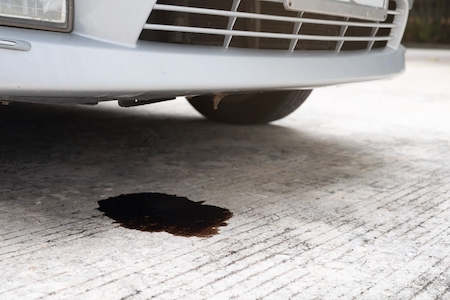As a driver, you’ve come to dread slipping behind the wheel and finding your car makes a new sound or has a new smell. You might be unable to put your finger on it, but you know your car has an issue.
You might get that same feeling when you discover a puddle underneath your vehicle.
Car leaks can often be a source of confusion and worry, but fear not – not all of them are bad news. Let’s break down the types of car leaks, their potential consequences, and whether you should tackle the fixes yourself or bring your vehicle to a professional.
Why Car Leaks Can Be a Problem
Car leaks might seem like a minor annoyance, but they can evolve into significant problems if left unattended. Fluids such as oil, coolant, transmission fluid, and brake fluid play vital roles in keeping your vehicle running smoothly. If any of these fluids are leaking, it can lead to reduced performance, overheating, brake failure, or even engine damage. Ignoring leaks could not only cost you more in repairs down the road but also compromise your safety.
So, what are they? What might you find underneath your car?
Clear Liquid Car Leaks
Clear fluid leaks are often water or condensation from your vehicle’s air conditioning system. This is generally harmless and is quite common, especially during hot weather.
What To Do: There’s no need to panic if you notice clear liquid pooling beneath your car. However, if the volume of liquid seems excessive or you suspect it’s not just water, having a professional inspect your vehicle is a good idea.
Amber/Multicolored Fluid Car Leaks
Amber or multicolored fluid leaks could indicate a problem with your fuel system. It might mean you’re leaking fuel. These fluids typically appear amber straight on with a colorful wave then the lights hit it just right. It has a distinctive smell and might be slimy to the touch.
What To Do: It’s essential to pay attention to amber or multicolored fluid leaks. Gas is highly flammable. Cleanup is necessary if it’s in your garage or on your driveway. You may notice decreased fuel efficiency, too. Fuel leaks often occur because of a crack or hole in the fuel line or tank. Consult with a professional to determine the source of the leak and the appropriate action to take.
Red Fluid Car Leaks
Red fluid leaks often indicate a problem with your transmission or power steering system. Transmission fluid is usually bright red, while power steering fluid can also be red but slightly thinner in consistency.
What To Do: Low transmission fluid can lead to gear shifting issues and potential damage to your transmission. Similarly, power steering fluid leaks can make steering more difficult. If you notice red fluid leaks, consult a professional to assess the situation and make necessary repairs.
Brown/Black Fluid Car Leaks
Brown or black fluid leaks are usually associated with engine oil leaks. Engine oil is essential for lubricating your engine’s moving parts and maintaining its performance.
What To Do: Engine oil leaks can decrease engine efficiency and potentially severe damage if not addressed promptly. Check your oil levels and consult a professional to pinpoint the leak’s source and get the necessary repairs done.
Red/Brown Fluid Car Leaks
A leak that combines red and brown fluids located by the power steering reservoir could be power steering fluid. It will have a slightly sweet, burnish smell to it. A faulty transmission connection or other issues could cause this.
What To Do: While you can continue driving, seeking professional help is wise. Over time, the fluid will continue to leak and drain out of the system. Driving on low levels can quickly cause lasting damage.
Green/Yellow Fluid Car Leaks
Green or yellow fluid leaks are typically associated with coolant leaks. Coolant is vital for regulating your engine’s temperature and preventing it from overheating.
What To Do: If you spot green or yellow fluid leaks, it’s crucial to address the issue promptly to prevent engine overheating. Low coolant levels can lead to engine damage, so consult a professional to identify the source of the leak and carry out the necessary repairs.
Brown Fluid Car Leaks
Brown fluid leaks are often linked to brake fluid leaks. It’s one of the most serious leaks, and can quickly lead to significant damage. Brake fluid is essential for proper braking performance.
What To Do: If you observe brown fluid leaks under the wheels or around the brakes, your braking system might be compromised. Brake fluid leaks can lead to brake failure, so it’s imperative to have a professional inspect and fix the issue without delay.
Should I Bring My Car in to Fix Car Leaks or Attempt to Do It Myself?
Some leaks are worse than others. Yet telling the difference can take a bit of sleuthing on your part.
While some minor leaks might be manageable with basic DIY skills, it’s generally safer to have leaks inspected and repaired by trained mechanics. Professionals possess the knowledge, tools, and experience to accurately diagnose the issue and provide effective solutions, ensuring your vehicle remains safe and reliable.
We feel car leaks should not be taken lightly. They can signal underlying issues that, if ignored, could lead to costly repairs and compromised safety. Familiarize yourself with the various types of leaks and their potential implications, and don’t hesitate to give us a call if you notice any abnormalities. Your car’s health and your own safety are worth the investment in proper maintenance and timely repairs.
We’re dedicated to keeping your vehicles in optimal condition. If you have any concerns about car leaks or any other automotive issues, don’t hesitate to reach out to our experienced team. Your peace of mind and the well-being of your vehicle are our top priorities. Stay safe on the road!

